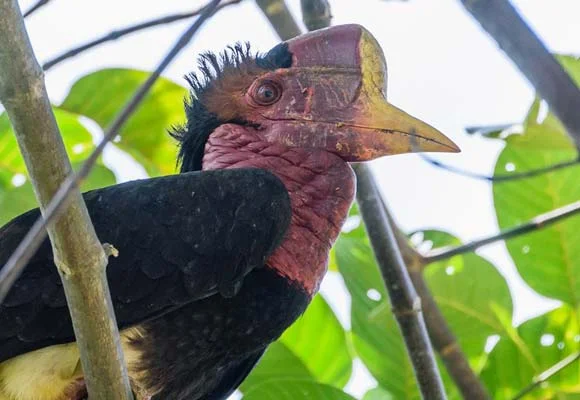On 18th January 2025, BirdLife International and the Oriental Bird Club (OBC) jointly hosted a special webinar on tackling the threat of illegal mist-net use in the East Asian-Australasian Flyway (EAAF). The bilingual webinar, with simultaneous English and Mandarin translation, highlighted the scale of illegal bird trapping in the EAAF using mist-nets, heard case studies from conservationists on the ground, and showcased some of the action being taken to address the issue.
Illegally trapped Siberian Rubythroat (left) and an illegally set mist-net (right). © Oriental Bird Club
Although data are sparse, available evidence indicates that illegal use of mist-nets is responsible for the deaths of millions of migratory birds each year in Asia alone, significantly contributing to biodiversity loss in the region and hastening the population decline of many species, some of them threatened with extinction. In 2022, under China’s presidency of the UN Framework Convention on Biological Diversity (UN CBD), more than 190 countries agreed to slow and stop biodiversity loss and, if the goals are to be reached, it is vital to tackle the illegal killing of wild birds using mist-nets.
Mist-nets are primarily used by poachers to catch wild birds for the cage bird trade and/or for food and by farmers to shield crops, such as fruit, fishponds or shellfish from wild birds. Mist-nets are also used for legitimate scientific study.
During the webinar, following a broad introductory overview by BirdLife’s Yong Ding Li and host Terry Townshend, close to 130 participants from around the world heard case studies from south and north Vietnam (Trang Nguyen from WildAct Vietnam and Nguyen Hoai Bao of WildTour and BirdLife International), Thailand (Rongrong Angkaew of King Mongkut’s University of Technology Thonburi) and China (Dan Liang of Princeton University). The case studies brought home the scale of illegal mist-net use in Asia for poaching and crop protection and some of the pioneering work to engage with authorities and local communities to try to reduce bird mortality, especially in wetlands and production landscapes in the region.
Representatives from the Supreme People’s Procuratorate of China – Deputy Director General Qiu Jinghui and Prosecutors Mou Qi and Ding Shu – then gave short presentations on the action being taken in China to tackle this issue. Deputy General Qiu revealed that addressing illegal mist-net use was now a high priority for the Supreme People’s Procuratorate who are focusing on “preventative, systematic and co-ordinated protection of wild birds.” The prosecutors had engaged with e-commerce platforms where mist-nets are cheaply and easily available to flag to anyone searching for mist-nets that their use to catch or kill wild birds is illegal. The national level prosecutors had also instructed provincial level prosecutors to prioritise the control of mist-nets. Case studies were presented in which local officials, after finding wild birds were being killed using mist-nets, had engaged with local communities to raise awareness of the law relating to wild bird protection and to explore alternative crop protection methods that do not involve the killing of wild birds. In 2025 research will take place into identifying a standard for anti-bird nets that protect crops but are more visible to birds, for example nets with a thick cord, and controlling the production and public sale of nets with a thinner cord. The prosecutors also noted that some of the mist-nets being used in Thailand and Vietnam had been imported from China and they will explore the potential to restrict their export from China.
The webinar was closed by Paul Insua-Cao, Chair of OBC’s Conservation Committee, who noted that the Club had already provided a grant to WildAct Vietnam for the work described in the presentation and encouraged further applications for small grant funding from organisations and individuals in the region to work on the issue. He also encouraged donations to OBC through the website to support fund projects on this issue.
Many webinar participants expressed surprise at the scale of the illegal use of mist-nets but were encouraged by the action being taken both by dedicated conservationists across the region and the authorities in China.
BirdLife International and Oriental Bird Club, together with the webinar speakers and participants, agreed to continue discussions around illegal mist-net use and explore opportunities for further collaboration to share experiences and good practices with a view to accelerating progress towards reducing and, ideally, eliminating the illegal use of mist-nets to catch wild birds in the EAAF.
BirdLife International and the Oriental Bird Club thank all the speakers, participants and interpreters for their insightful and meaningful contributions to the webinar.









